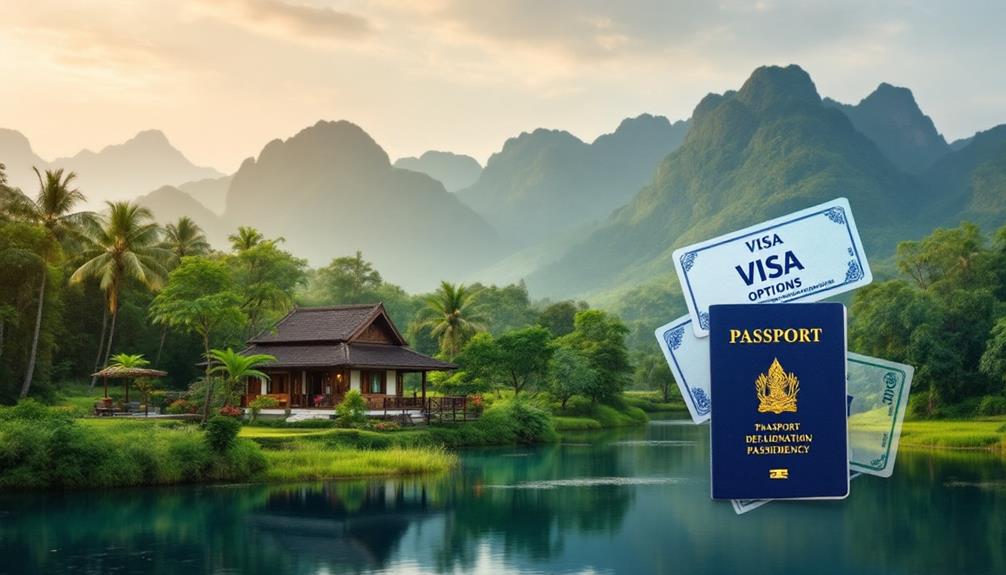Can You Stay in Thailand if You Buy a House?
When you consider buying a house in Thailand, it's essential to understand that owning property doesn't automatically grant you the right to stay long-term. The allure of stunning beaches and vibrant culture might tempt you, but steering through Thai property laws requires careful attention. You'll need to explore visa options, as ownership alone isn't enough for residency. Are there legal ways to own property that could ease your path to a more permanent stay? And what about the tax implications and potential pitfalls you might encounter? Understanding these aspects could shape your Thai adventure in unexpected ways.
Key Takeaways
- Buying a house in Thailand does not guarantee long-term residency or a visa.
- Property ownership may support visa applications but is not sufficient on its own.
- Various visa options, like retirement or business visas, are needed for staying in Thailand.
- The Thailand Elite Visa program offers long-term residency but requires membership fees.
- Compliance with legal standards and visa requirements is essential for residency in Thailand.
Understanding Thai Property Laws

Thailand's property landscape is a complex tapestry, intricately woven with legal stipulations that foreign buyers must traverse. Picture yourself as an explorer, machete in hand, slicing through the dense jungle of legalese. Here, property ownership isn't a straightforward endeavor.
You'll encounter a myriad of legal challenges that could make even the most seasoned attorney's head spin faster than a tuk-tuk in Bangkok traffic. First, familiarize yourself with the Land Code Act, the cornerstone of property laws in Thailand. Not only does it define what you can own, but it also meticulously outlines how you can own it.
For instance, foreign ownership of property in Thailand is limited to 49% in condominium buildings, and outright land ownership is generally restricted. You'll need to understand the nuances of owning land versus a condominium. Land ownership is a tricky creature, akin to trying to catch a greased pig, whereas owning a condo is slightly more straightforward but still requires deft handling of paperwork.
The due diligence process is your trusty compass. It's essential for traversing this labyrinth. You'll want to meticulously examine land titles and verify there's no hidden legal baggage, because nobody likes surprise guests at their legal party.
If you're up for the challenge, Thailand's property market awaits your intrepid spirit.
Foreign Ownership Restrictions
Maneuvering the domain of foreign ownership restrictions in Thailand requires a keen understanding of the legal landscape. You might be dreaming of sipping coconuts on your beachfront property, but hold your horses! Thailand's laws on foreign ownership are as clear as a coconut smoothie on a foggy day.
The Land Code Act of 1954 plainly states: foreigners can't own land. But don't dash your dreams yet, as there are exceptions—well, sort of. For example, while foreigners can't own land, they can rent property in Thailand by adhering to local rental laws and obtaining the necessary visas.
Foreign ownership in Thailand is more like a dance with the legal system. You can own a condominium, but here's the catch: only 49% of the building's units can be foreign-owned. So, it's a race against your fellow expats.
When it comes to houses, you can own the building, but not the land beneath it. Think of it as owning a car but renting the driveway—convenient, right?
Property rights in Thailand for foreigners are a labyrinth. You've got to navigate through laws, regulations, and yes, sometimes, the whims of bureaucracy. But fear not! With enough legal savvy—and perhaps a trusty local lawyer—you can tiptoe through these restrictions without breaking a sweat, or the bank.
Legal Ways to Own Property

Owning property in Thailand as a foreigner requires strategic navigation through legal frameworks and a solid understanding of the available avenues.
First off, let's debunk the myth: you can't just waltz in, buy a house, and call it a day. Instead, consider the condo route, where foreigners can legally own up to 49% of the building's total space. That's right, you can own a slice of paradise without the whole pie, making it an appealing property investment.
When considering locations, it's essential to recognize that urban houses in Bangkok are considerably more expensive than rural properties, which impacts investment decisions.
But what if you're eyeing some land? Brace yourself for a plot twist. You can't directly own land, but you can set up a Thai company to do so. This option comes with a caveat: Thai citizens must hold at least 51% of the company's shares. It's like hosting a party where you own the music but not the speakers.
For those who enjoy a good legal puzzle, there's also the Board of Investment route, granting land ownership for considerable investments.
Leasehold vs. Freehold
The distinction between leasehold and freehold is essential for foreigners considering property investment in Thailand. Imagine leasehold as a long-term rental agreement where you get the keys but not the title. It's akin to a "try before you buy," minus the buying part. Leasehold benefits include a tenure of up to 30 years, which is renewable twice, giving you a potential century of rights without the commitment of marriage. However, brace yourself for possible headaches if renewal terms shift like the tides.
| Aspect | Leasehold | Freehold |
|---|---|---|
| Ownership | Time-limited (up to 90 years) | Permanent |
| Renewal | Potential for renegotiation | Not applicable |
| Legal Control | Limited | Extensive |
| Transferability | Restricted | Simple |
| Cost | Generally lower upfront | Higher upfront |
Now, let's tackle freehold. It sounds romantic—eternal ownership! But here's the freehold drawback: foreigners can only own condos freehold, not land. Imagine buying a house but only owning the second floor. Plus, freehold comes with heftier upfront costs. Balancing leasehold benefits against freehold drawbacks requires a discerning eye and a healthy sense of humor. After all, real estate is serious business—until the plumbing fails.
Thailand's Visa Options

Steering property investment in Thailand inevitably leads to questions about residency, and that's where understanding Thailand's visa options becomes essential.
While a house purchase won't hand you a long-term stay on a silver platter, it can facilitate certain visa categories that might make your dream of sipping coconut water on a Thai beach a bit more plausible.
You've got options like the Non-Immigrant B Visa, which caters to business folks and investors. But hold your horses—property financing alone won't cut it here.
Keep in mind that urban areas typically have higher property prices, which could influence your investment decisions.
If you're eyeing retirement, the Non-Immigrant O-A Visa could be your golden ticket, provided you've got the age—50 and up—and financial means.
For those not ready to retire but still yearning to join the digital nomad ranks, the Smart Visa might be your best bet. It's not just for techies and startup enthusiasts; it covers a range of professions.
Each visa category comes with its own residency pathways and investment options, but be sure to read the fine print.
Residency Through Investment
While buying property in Thailand doesn't automatically grant residency, it can serve as a strategic stepping stone towards obtaining it through investment. By investing in Thai property, you can potentially access a series of investment benefits that might've you considering a permanent stay in the Land of Smiles.
Now, don't go packing your bags just yet—Thailand's legal system, though enticing, demands a bit more than a housewarming party to grant you residency status.
One potential avenue is the Thailand Elite Visa program, a membership-based scheme offering long-term residency with varying durations and benefits, such as expedited immigration processing and VIP airport services.
Membership costs a pretty penny, but hey, who said luxury comes cheap? If you play your cards right, property appreciation could be your ace in the hole, enhancing your financial portfolio and fortifying your application for these investment visas.
Property and Retirement Visas

Considering a retirement visa in Thailand requires a detailed understanding of legal stipulations and financial commitments, especially when property ownership is involved. You might imagine a retirement filled with tropical sunsets, but let's not forget the legal labyrinth that accompanies such dreams. Steering through the intricacies of Thai law is like trying to find a coconut in a haystack.
To qualify for a retirement visa, you'll need a financial plan that demonstrates your ability to sustain yourself, which can be as complex as a Sudoku puzzle. Owning property doesn't automatically grant you a visa, but it can be part of your retirement planning strategy. Here's a quick snapshot to keep you on track:
| Requirement | Explanation |
|---|---|
| Financial Proof | Show 800,000 THB in a Thai bank |
| Age Limit | Be at least 50 years old |
| Property Maintenance | Guarantee upkeep of your Thai residence |
| Annual Visa Renewal | Don't forget to renew, or else! |
Buying Condos as a Foreigner
Foreigners eyeing the Thai real estate market will find that purchasing a condominium is among the most straightforward options available under Thai property law.
Unlike the complexities of maneuvering a house purchase, buying a condo doesn't require knowing a secret handshake or deciphering ancient scrolls. Under the Condominium Act, you're permitted to own up to 49% of a condominium building's total area, a rule that opens doors wider than a tuk-tuk on a rainy day.
Now, condo financing—let's tackle this beast. You'll need to secure financing outside Thailand since local banks treat foreign borrowers like UFO sightings: intriguing, but not credible.
On the bright side, international banks or your home-country institutions may offer financing options. Just remember, when it's time for property resale, you can't sell to just anyone.
You'll need to guarantee the foreign ownership quota remains untouched, or the sale could become a legal quagmire faster than you can say "Pad Thai."
The Role of Thai Nominees

When considering using Thai nominees to purchase property, understand the significant legal implications involved, including potential breaches of Thai law prohibiting foreign ownership of land.
You risk facing legal challenges if authorities determine that nominees are merely holding property on your behalf, which can lead to the property's forfeiture.
It's essential to assess the risks of nominee arrangements thoroughly and seek legal counsel to guarantee compliance with local regulations.
Legal Implications for Nominees
Steering through the intricacies of Thai property law, you'll encounter the role of nominees, a critical aspect to understand for any foreigner buying a house in Thailand.
Nominee agreements can feel like wading through a legal swamp, with terms and conditions lurking like hidden crocodiles. Fundamentally, a Thai nominee stands in as the official owner on paper while you, the foreign investor, pull the financial strings.
However, don't let that imagined power go to your head; legal accountability rests heavily on your shoulders.
Navigating this setup requires a flair for the dramatic and an eye for detail. Even with a trusty nominee, the Land Department frowns upon any arrangement that appears to bypass foreign ownership restrictions.
So, tread carefully, as Thai authorities can scrutinize nominee agreements like a nosy neighbor peeking over the fence. If the nominee relationship seems more fiction than fact, you could face hefty consequences.
Therefore, understanding the legal framework is paramount. Think of it as a high-stakes game of chess—one wrong move, and you'll find yourself in checkmate, possibly with a court summons as your consolation prize.
Risks of Using Nominees
Engaging a Thai nominee in property transactions carries significant risks that you can't afford to overlook. While nominee agreements might seem like a loophole to foreign land ownership restrictions, they are fraught with investment risks that can make your head spin faster than a tuk-tuk in rush hour. Thai law explicitly prohibits foreigners from owning land, making nominee agreements a legal gray area that authorities frown upon.
| Risk | Impact | Mitigation |
|---|---|---|
| Legal Consequences | Potential confiscation of property | Avoid using nominees entirely |
| Nominee Control Issues | Nominee may assert ownership rights | Draft detailed agreements |
| Tax Implications | Possible tax evasion charges | Consult a tax professional |
Nominees may not always act in your best interest, easily converting your dream investment into a nightmare. The Thai nominee might suddenly decide they like their name on that lovely beachfront property a bit too much. Additionally, tax implications can rear their ugly heads, potentially leading to charges of tax evasion if authorities suspect foul play.
In the whimsical world of Thai property, relying on a nominee is akin to betting your life savings on a game of snakes and ladders. It's unpredictable, risky, and likely to land you in hot legal water. Always remember, when it comes to property investments, it's better to be safe than sauna-hot.
Tax Implications for Foreign Buyers
Maneuvering the tax landscape as a foreign buyer of property in Thailand requires a thorough understanding of local tax obligations. You might wonder if buying a house declares you a tax resident or if your foreign income suddenly becomes of interest to the Thai taxman. Here's a roadmap to help you navigate:
1. Tax Residency: Buying property doesn't automatically make you a tax resident. To achieve that status, you'd need to spend at least 180 days a year in Thailand. So, unless you're planning to enjoy endless beach days, you're likely safe.
2. Foreign Income: Thailand taxes foreign income only if it's brought into the country in the same year it's earned. So, stash that cash abroad a little longer, and avoid an extra tax bill.
3. Transfer Fees and Taxes: You'll encounter transfer fees (2% of the appraised property value) and a specific business tax if you sell within five years.
Don't forget the stamp duty, unless you're seeking thrills by evading it.
4. Withholding Tax: When selling property, prepare to part with 1% of the selling price as withholding tax. Call it a farewell gift to the Thai government.
In short, understanding these tax quirks can save you from unexpected surprises.
Common Pitfalls to Avoid

Maneuvering the process of buying property in Thailand as a foreigner comes with its share of common pitfalls that you should diligently avoid.
First, brace yourself for hidden costs. Think taxes, legal fees, and the mysterious "miscellaneous" charges that seemingly pop out of nowhere.
Property scams are prevalent, so be wary. If a deal sounds too good to be true, it probably is—don't let your dream home become a nightmare investment.
Keep a close eye on market trends. Investing when the market's hot might seem tempting, but remember: what goes up must eventually come down.
Understand the investment risks and don't place all your bets on a single dice roll.
Negotiation tactics vary greatly, so polishing your bargaining skills can help you navigate this intricate dance without stepping on cultural toes.
Maintenance issues can turn a charming villa into a money pit. Inspect properties thoroughly to avoid unexpected repair costs.
Cultural differences can also play a role in property dealings. A reliable agent is your best friend here, helping bridge any gaps and ensuring smooth transactions.
Choose an agent with a strong reputation and reliable track record—after all, you're not just buying property, you're investing in peace of mind.
Seeking Legal Advice
When maneuvering through the complexities of Thai property laws, it's essential you understand the legal framework governing foreign ownership to guarantee compliance and protect your investment.
You must also address visa requirements for expats, which can affect your long-term stay and property rights.
Engaging local legal experts will provide you with the necessary guidance to interpret these regulations accurately and facilitate a smooth transaction process.
Understanding Thai Property Laws
Maneuvering through Thai property laws requires a keen understanding of the legal landscape and often necessitates seeking professional legal advice to guarantee compliance.
You might think you've got it all figured out, but Thai property laws can be as tangled as a bowl of noodles. When it comes to property registration and land ownership, there's a lot to unpack.
1. Property Registration: It's not just about signing on the dotted line. You've got to make sure your property is registered with the Land Department.
Failure to do so might make your dream home vanish faster than your last paycheck.
2. Land Ownership: Foreigners can't own land directly in Thailand. You might feel like you're playing Monopoly, but the rules are different, and you can't pass "Go" without the right legal setup.
3. Leasehold Agreements: This is your workaround. You can lease land for up to 30 years.
Just remember, it's not a game of musical chairs; make sure the lease is legally sound.
4. Condominium Ownership: You can own a condominium in your name, but there's a catch—foreign ownership is capped at 49% of the building.
Talk about a balancing act!
You might want to consult a lawyer before diving in—just don't try to pay them in coconuts.
Visa Requirements for Expats
Maneuvering the visa requirements for expats in Thailand can feel like deciphering a complex code. You might think buying a house would open a magical door to permanent residency, but alas, it's more akin to finding a secret passage in a video game—it's there, but you'll need to jump through hoops.
As an expat indulging in the Thai lifestyle, you've got a few visa options to keep your dream alive.
Primarily, the Non-Immigrant Visa "O" or "B" is your passport to paradise. The "O" caters to retirees and those with Thai family ties, whereas the "B" targets business aficionados. Both allow you to settle in, but they don't offer long-term stays without regular visa extensions.
Extensions are your lifeline, akin to Wi-Fi—it's great when it works, but maddening when it doesn't. You'll need to renew your visa annually, proving you're not just there for the pad Thai.
For retirees, financial proof of funds in a Thai bank is essential. Remember, these visa extensions aren't automatic; they require meticulous paperwork akin to a legal treasure hunt. So, ready your pens, and maybe some aspirin for the process.
Engaging Local Legal Experts
Maneuvering the intricacies of Thai property law often necessitates the expertise of local legal experts, who can provide indispensable guidance.
You're not just buying a house; you're traversing a labyrinthine legal landscape that could make even a seasoned attorney break into a cold sweat.
Here's where local expertise is essential:
- Property Consultants: They help you understand market trends and craft investment strategies that won't lead you astray—like buying a beachfront property that turns out to be underwater, literally and legally.
- Legal Representation: A lawyer will guarantee regulatory compliance and manage contract negotiation with the finesse of a diplomat—because nobody wants to sign a contract that gives away their firstborn.
- Dispute Resolution: Should things go south faster than a migratory bird, you'll need someone who can handle disputes with the same ease as a Thai chef managing spices—carefully and expertly.
- Traversing Bureaucracy: Local legal experts will deal with paperwork that resembles a novel-length Sudoku puzzle, guaranteeing you're not stuck in an endless loop of red tape.
Without them, you might find yourself in a legal quagmire, contemplating whether it's easier to just buy a house in Narnia.










